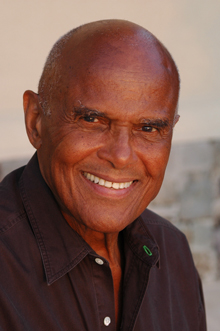
ARTIST/ACTIVIST Belafonte.
|
Singer Harry Belafonte, now 85, has engaged in a social activism of extraordinary breadth.The Calypso singer, best known for "The Banana Boat Song" with its signature "Day-O" refrain, bailed Martin Luther King, Jr. out of the Birmingham City Jail and financed the Freedom Rides.
He joined the fight against AIDS in South Africa and was a sharp critic of the Bush Administration. In widely published remarks, he called Bush's Secretaries of State Colin Powell and Condoleeza Rice "house slaves," prompting public rebukes from both.
Belafonte was in Providence January 29 to offer the keynote speech at the end of a month-long celebration of King at RISD. The speech, "Artist as Activist," was as provocative as always — urging black America to get more involved in the gun control movement and asserting that President Bush "stole" the 2000 election, among other things.
Before he took the stage, Belafonte sat down for a brief interview with the Phoenix at RISD's Market House — his voice raspy, dignified, and ever-radical. The interview is edited and condensed.
YOUR TALK IS TITLED "ARTIST AS ACTIVIST." IT SEEMS THERE'S A DEARTH OF ACTIVISM THESE DAYS IN MUSIC, IN THE FINE ARTS, ON THE SCREEN. ARE YOU DISAPPOINTED? I think that there are some really small exceptions to that rule. I think Bruce Springsteen's Wrecking Ball is an attempt by a very high-profile artist to make a social statement.
I think that the last outpouring of art and social consciousness really can be found during the 1960s, '50s, and so on. And well before that, because what we inherited in our day was art that had a sense of social purpose. Then came the great harvest of the post-civil rights period when everyone began to turn to meism. Most artists turned away from social activism. They were encouraged to, because if you are too outspoken, corporate America will silence you. They would not give you the platform for endorsements, they would not sponsor your shows. It's almost like an act of McCarthyism, censorship.
What's happened is that that contamination has taken over almost completely. The inordinate sums of money that people are paid for the work that they do has changed their whole sense of the mission of art.
Art has become an instrument of technology. All the things that you see are more about manipulating the technical device. The content is thrown away.
YOU APPEARED IN A CAMPAIGN COMMERCIAL FOR JFK IN 1960. CAN YOU IMAGINE DOING THAT FOR ANY PRESENT-DAY POLITICIAN? I'd gladly do it for every politician I met if they had [the] values, platform, and purpose that I thought commanded my support.
DOES ANYONE COMMAND THAT SUPPORT THESE DAYS? Barack Obama did. And in a way, he still does. But there are many questions here. We'll see what happens with his second term. I do believe if he fails, and we fail, to use this moment to take America to another level and to another set of values and objectives, we will have lost the ability to change this country in a way that it needs to. I think that we'll be just on an express to Hell. It's all too fast, it's much too much, it's all scattered — where we are and our sense of purpose.